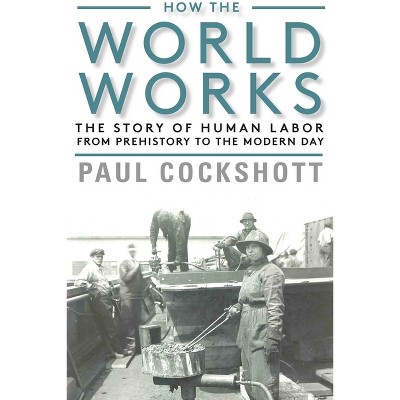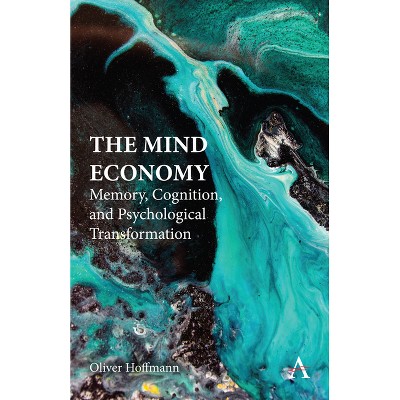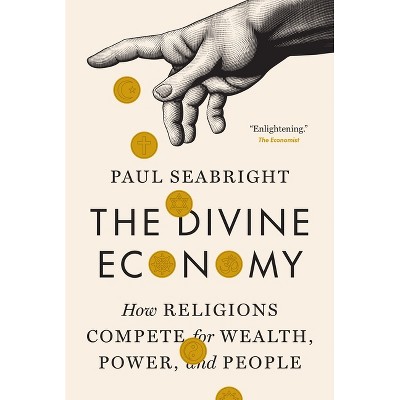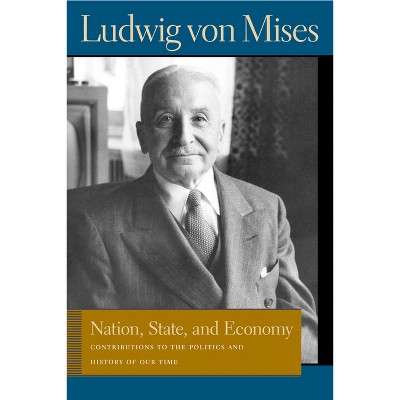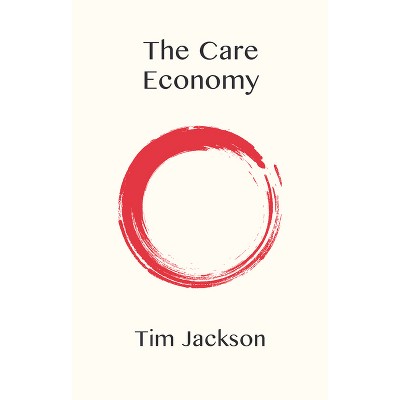Sponsored

Making of the Economy - by Till Düppe (Hardcover)
$129.00
In Stock
Eligible for registries and wish lists
Sponsored
About this item
Highlights
- The Making of the Economy uses Husserl's critique of formalism in natural science in The Crisis of the European Sciences work as the template for an analogous critique of formalism in economic science.
- About the Author: Till Düppe is scientific researcher at the University of Hamburg.
- 250 Pages
- Philosophy, Movements
Description
About the Book
The Making of the Economy uses Husserl's critique of formalism in natural science in The Crisis of the European Sciences work as the template for an analogous critique of formalism in economic science. The historical narrative focuses on the emergence of formal economic analys...Book Synopsis
The Making of the Economy uses Husserl's critique of formalism in natural science in The Crisis of the European Sciences work as the template for an analogous critique of formalism in economic science. The historical narrative focuses on the emergence of formal economic analysis out of a series of successive life-worlds, or concrete historical situations. This generates new substantive understanding of both the historical material and the current discourse of crisis surrounding economics. It will appeal to historians and philosophers of economics, as well as scholars of history, philosophy, and sociology.Review Quotes
Any book that concludes with the argument that economic science "must fall for the sake of social responsibility and for the sake of moral integrity in economic discourse" is going to be provocative This book is that, but it is also informed and insightful, which makes it a worthwhile read.
As its subtitle indicates, this book is a reflection on the idea of economics as 'science' from the vantage point of the phenomenological tradition in philosophy. Düppe asks a two sided question: what in the life-world creates the opportunity for the expertise that might go by the name of 'economic science'; and what interests have led would-be economists to respond. The book is very interesting from a number of vantage points within economics itself, giving depth and perspective to themes in the history of economics, to economic theory and methodology, and to contemporary conversations about what 'economics' is (or is not).
In his illuminating and provocative book The Making of the Economy, Till Du¨ppe examines the economics profession, diagnoses a lack of confidence in its methods and declares the profession to be in crisis. ... I have only been able to give a sense of the sheer enormity of the ground covered by this highly engaging book: hermeneutics, prescientific economics, the scientific attitude of Gerard Debreu, economics imperialism and much besides. Du¨ppe has performed a valuable service in providing motivation for reflecting on how economists' epistemic authority is actually used, and in providing a structure for organizing these reflections. His book vividly illustrates the benefits of bringing together history and philosophy to evaluate economics, an approach John Davis (2012) has persuasively argued economic methodologists should adopt. It encourages one to pose some hitherto-unasked questions: Would the end of economics restore meaning to our intellectual projects? Would this breakup make it more or less likely that opportunistic uses of epistemic authority would be successfully challenged? Put bluntly, would it liberate or oppress us?
Now more than ever -- after the Global Financial Crisis, in the midst of the Second Great Depression -- it is necessary to think critically about the relationship between economics and science, to interrogate the epistemic authority of mainstream economics. Till Düppe, in his The Making of the Economy, bravely takes up that challenge; bringing together history and phenomenology, he shows that mainstream economists 'made the economy' by adopting a distanced attitude, a culture of suspicion, toward their object of study. But, along the way -- through quantification and formalism, by invoking science as the beginning and end of economic practice, by forgetting about the life-world -- the discipline of economics lost its reason for being. But Düppe does not mourn the loss of mainstream economists' scientific authority. It was of no help to them anyway. Instead, he offers the only possible way of moving forward and thus of reviving interest in economic life: "Economists of the World-Disperse."
The book is highly original, thought-provoking, and rich in its survey of the entire history of economics. ... [Düppe] is surely to be commended for his impressive knowledge of the history of economics, which exceeds that of not a few more senior scholars. And his writing a whole history also prompts us to ask: where are the ambitious histories of economics among the publications of historians of economics today?
The intended audience for the book consists of both philosophers and economists, with Düppe aiming to construct the book so as to make phenomenology amenable to economists while the discreetness of economic theory is made more transparent to non-specialists. ... And one of the greatest virtues of this book, from the perspective of a fellow Continental philosopher interested in but by no means trained in economics, is the historical narrative Düppe constructs and which weaves in and out of general assumptions and minute but substantial points of theoretical detail. ... Düppe's book makes a significant contribution towards a better understanding of the very thing that seems to dominate our lives yet remains furthest from our understanding. Moreover, for any scholar or student wishing to have a competent, critical, and accessible overview of economic history, especially the postneoclassical, this book remains a much-needed resource
These days, intellectual historians rarely construct their books self-consciously so as to exemplify a pre-existent well-developed philosophy of knowledge. Till Düppe bucks that trend, portraying the history of modern neoclassical economics as an illustration of Husserl's Phenomenology. Continental philosophy meets the history of Arrow-Debreu general equilibrium theory, and is contrasted with Husserl's inquiry into the mathematization of nature by Galileo. It sounds dry, but Düppe's writing style is conversational, and he makes sparks fly. His vision of the future of the economics profession is grave. The shopworn complaint concerning the unrealism of neoclassical mathematical economics has just experienced future shock.
This is a remarkable book at many levels, erudite and bold and, in some passages, brilliant. . . .[Düppe] emphasizes that human beings produce economics and yet the experiences of economists, their beliefs, values, struggles, are suppressed if not entirely erased so as to create the appearance that the science of economics is objective and anonymous. . . .[D]espite the immense success of economics in filling the classrooms (some thirty thousand American students major in economics each year), almost everyone seems to sense that economic theory is irrelevant to what matters. Read this book and judge for yourself. Every page is bound to provoke interesting thoughts even if the jury is still out.
About the Author
Till Düppe is scientific researcher at the University of Hamburg.Dimensions (Overall): 9.1 Inches (H) x 6.1 Inches (W) x .9 Inches (D)
Weight: 1.1 Pounds
Suggested Age: 22 Years and Up
Number of Pages: 250
Genre: Philosophy
Sub-Genre: Movements
Publisher: Lexington Books
Theme: Phenomenology
Format: Hardcover
Author: Till Düppe
Language: English
Street Date: October 24, 2011
TCIN: 1004353238
UPC: 9780739164198
Item Number (DPCI): 247-28-5890
Origin: Made in the USA or Imported
If the item details aren’t accurate or complete, we want to know about it.
Shipping details
Estimated ship dimensions: 0.9 inches length x 6.1 inches width x 9.1 inches height
Estimated ship weight: 1.1 pounds
We regret that this item cannot be shipped to PO Boxes.
This item cannot be shipped to the following locations: American Samoa (see also separate entry under AS), Guam (see also separate entry under GU), Northern Mariana Islands, Puerto Rico (see also separate entry under PR), United States Minor Outlying Islands, Virgin Islands, U.S., APO/FPO
Return details
This item can be returned to any Target store or Target.com.
This item must be returned within 90 days of the date it was purchased in store, shipped, delivered by a Shipt shopper, or made ready for pickup.
See the return policy for complete information.
Frequently bought together

Highly rated
$15.44
MSRP $19.99
Buy 2, get 1 free select books, music & movies
4.6 out of 5 stars with 18 ratings

Highly rated
$10.84
MSRP $15.99
Buy 2, get 1 free select books, music & movies
4.6 out of 5 stars with 36 ratings

$12.84
MSRP $16.00
Buy 2, get 1 free select books, music & movies
4.5 out of 5 stars with 41 ratings


$18.88
MSRP $27.00
Buy 2, get 1 free select books, music & movies
4.8 out of 5 stars with 571 ratings
Trending Philosophy

$13.99 - $23.05
MSRP $25.00 - $40.00
Buy 2, get 1 free select books, music & movies
4.4 out of 5 stars with 198 ratings

$15.00
MSRP $25.00
Buy 2, get 1 free select books, music & movies
4.5 out of 5 stars with 4 ratings

$10.23
was $10.78 New lower price
Buy 2, get 1 free select books, music & movies
4.6 out of 5 stars with 22 ratings

$8.18
MSRP $11.00
Buy 2, get 1 free select books, music & movies
4.8 out of 5 stars with 5 ratings

$12.69
MSRP $22.99
Buy 2, get 1 free select books, music & movies
5 out of 5 stars with 1 ratings

$7.26
MSRP $12.00
Buy 2, get 1 free select books, music & movies
4 out of 5 stars with 2 ratings
